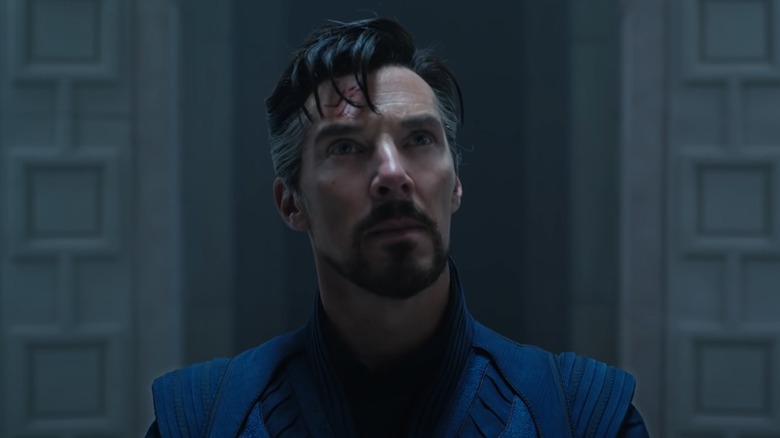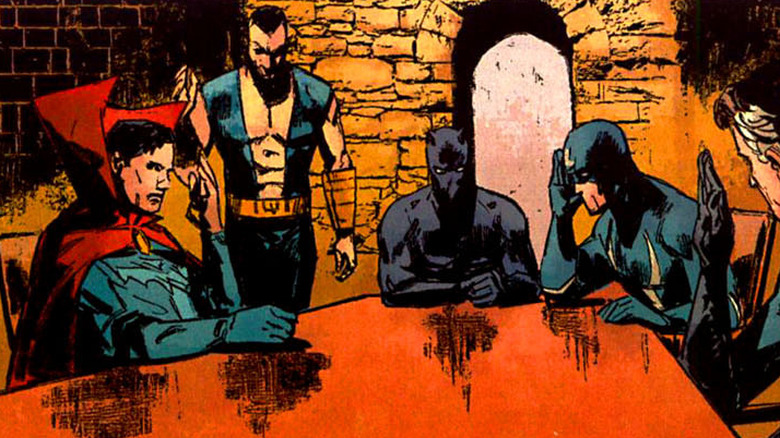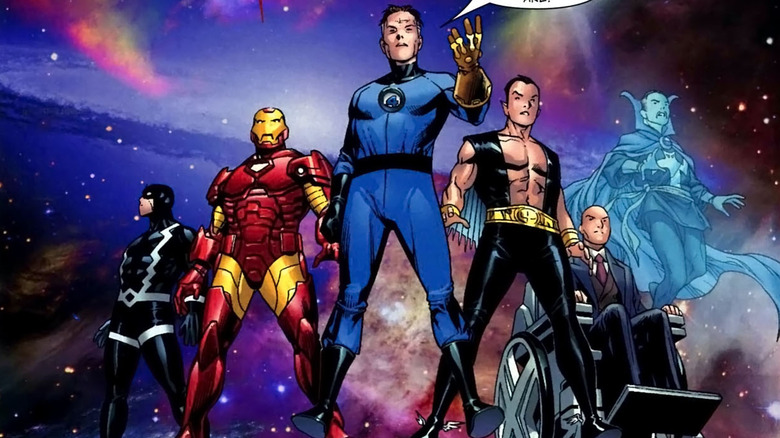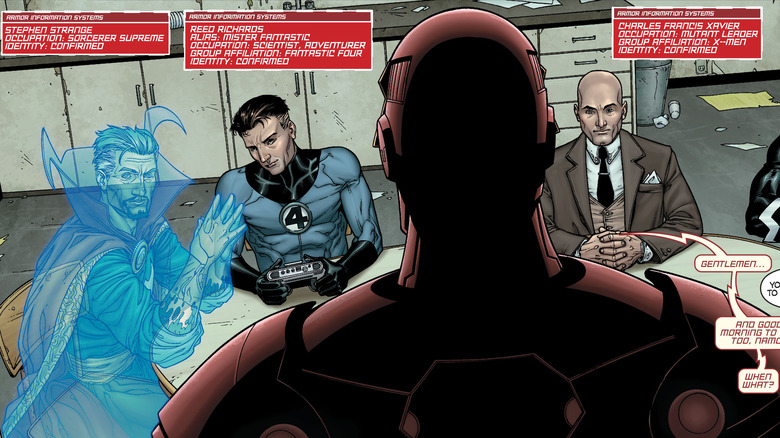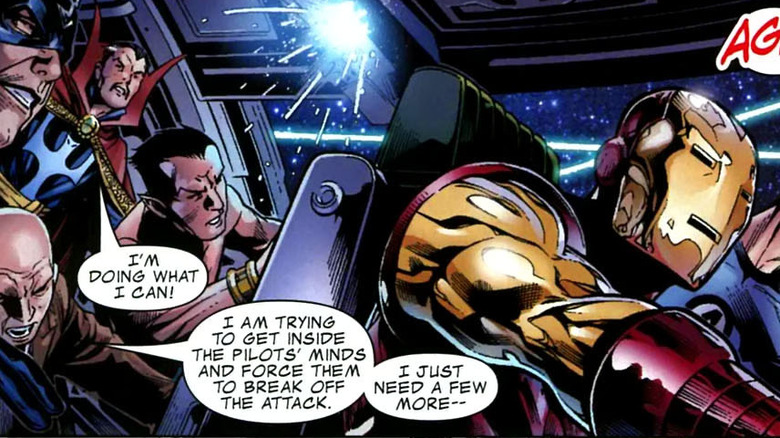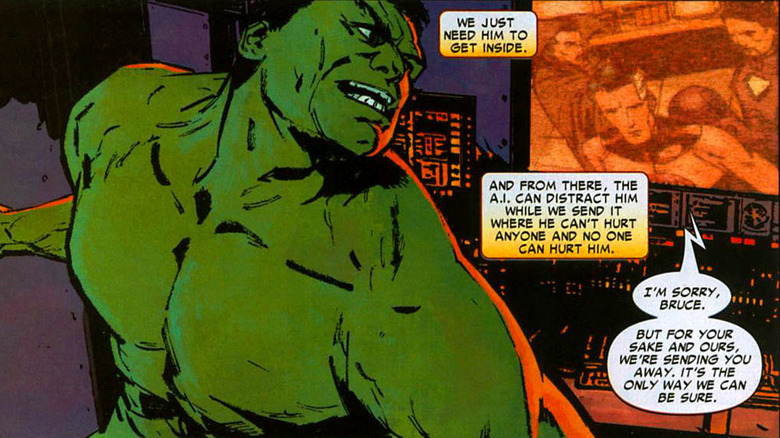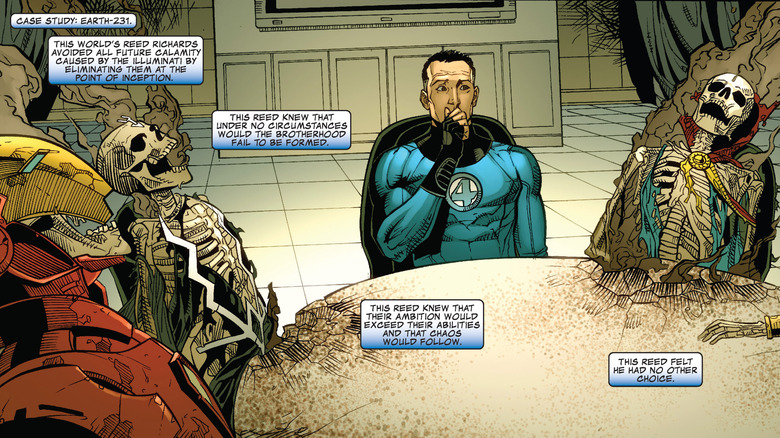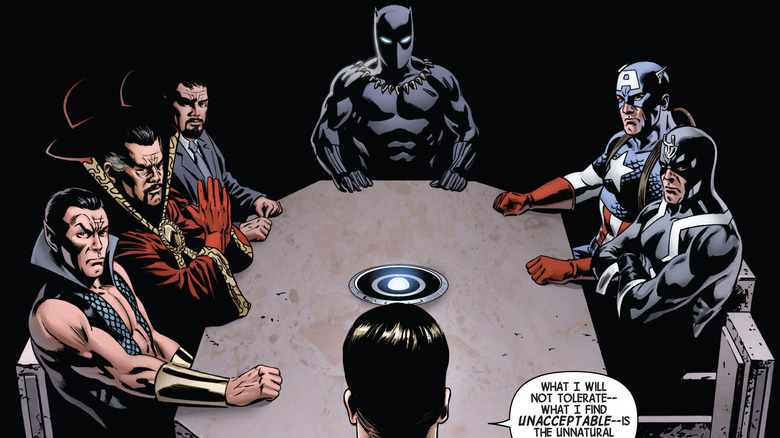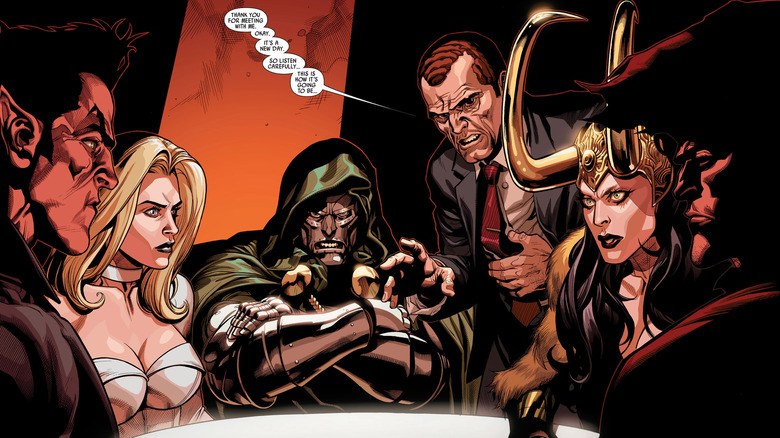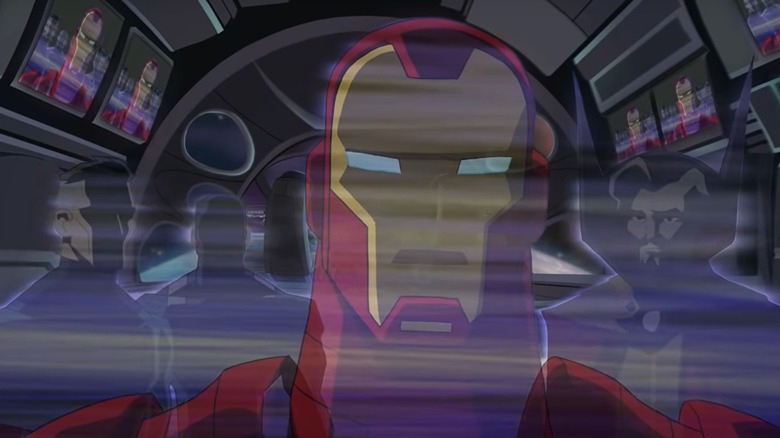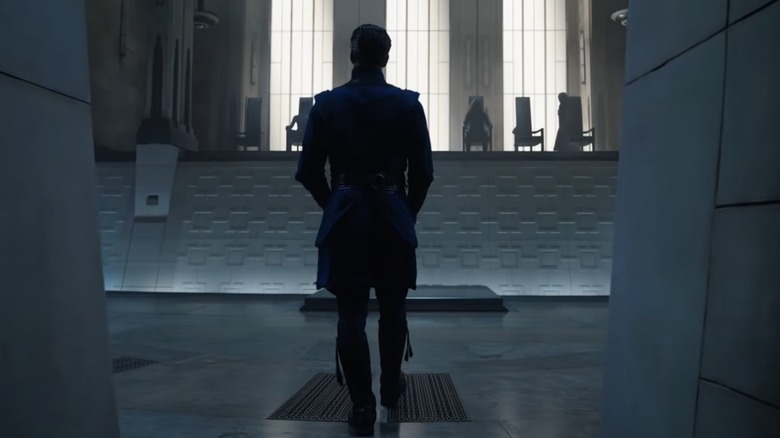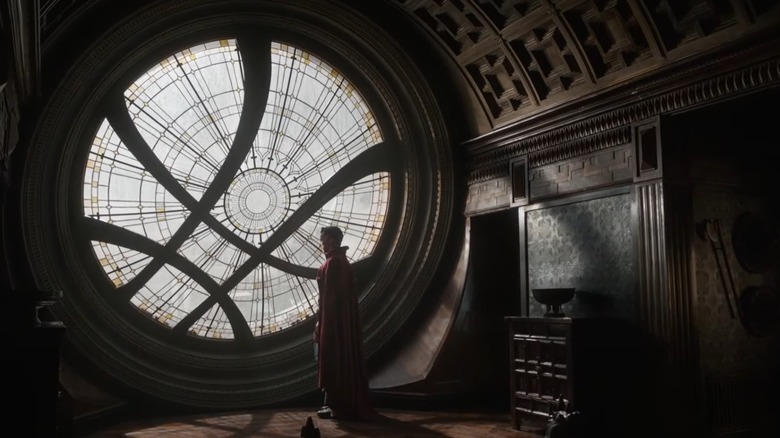The Untold Truth Of Marvel's Illuminati
The Marvel Universe has seen the formation of many superhero teams over the years. The most famous, of course, is the Avengers, the now-iconic group of Earth's Mightiest Heroes that made its comic book debut in 1963. Today, that name sells billions of dollars worth of ticket sales at the worldwide box office. But the Avengers certainly don't stand alone — Marvel's long list of super-teams includes the Fantastic Four, the X-Men, the Guardians of the Galaxy, the Young Avengers, Heroes for Hire, the Eternals, the Midnight Sons, the Secret Warriors, and many, many more.
It seems fitting, considering the group's name, that the Illuminati is one of the lesser-known teams in the Marvel Universe. Nevertheless, this secret society of superheroes has had a hand in some of the most important events in Marvel's long history, stretching back all the way to the early 1970s — despite only being introduced in 2005. The Illuminati can also be counted among the more curious teams in Marvel's roster, featuring a seemingly mismatched line-up, a fascinating group dynamic, and the kind of moral ambiguity you'll rarely find in the Avengers or the Fantastic Four. And now that the team (or at least, one version of it) has made its MCU debut in "Doctor Strange in the Multiverse of Madness," there's no better time to dive in and find out more. This is the untold truth of Marvel's Illuminati.
A new team for the Marvel Universe
The Illuminati was introduced to Marvel Comics by Brian Michael Bendis and Steve McNiven in 2005. The concept of the team is simple: it is a group of highly intelligent and powerful superheroes who meet in secret in order to exchange information regarding major threats to Earth and its people. In 2006, Bendis explained a little more about the Illuminati's past in an interview with CBR. "They actually were like a secret super group," he told the publication. "Sometimes they acted together directly. Some things were more conspiratorial. Some things were happening behind the scenes in other events. [...] We've found places in stories that the Illuminati fit into quite nicely without retconning anything or changing the meaning of the story."
Although Bendis expressed his satisfaction that the Illuminati could fit into the Marvel Universe without the need for retcons, the truth is that it was founded on one. According to the 2006 comic book miniseries "New Avengers: Illuminati" Vol. 1, the team was formed in the aftermath of the Kree-Skrull War, a major arc that began in 1971 and ended a year later — meaning the Illuminati had to be retroactively inserted into events that took place before its comic debut. "If anyone is familiar with this play [...] called 'Rosencrantz and Guildenstern Are Dead,' which follows those two characters as the main story," Bendis told CBR. "A couple of our scenes have the feel of that, where we know this famous event is happening in the next room, but here is this other thing going on that you may not know about."
Despite this odd quirk of its conception, the Illuminati has gone on to become one of Marvel's most fascinating — and arguably most important — superhero teams.
The classic Illuminati line-up
In the Illuminati's first appearance, in "New Avengers" Vol. 1 #7, the group consists of six members. Although other heroes have joined and departed the team over the years, this original roster quickly became known as the definitive line-up.
Each member of the Illuminati wields some kind of crucial form of influence or power over a corner of the Earth. Tony Stark, of course, is the genius billionaire playboy philanthropist known as Iron Man; Doctor Stephen Strange is the planet's Sorcerer Supreme and Master of the Mystic Arts; Reed Richards, aka Mister Fantastic, is a genius scientist and leader of the Fantastic Four; Professor Charles Xavier is a remarkably powerful mutant and leader of the X-Men; Blackagar Boltagon, aka Black Bolt, is ruler of the Inhumans and a strong contender for Marvel's worst-named character; and Namor the Sub-Mariner is King of Atlantis. In short, the Illuminati aren't to be trifled with.
It's also worth mentioning that, according to "New Avengers: Illuminati" Vol. 1 #1, King T'Challa, aka Black Panther, was originally invited to join the team. He declined, however, having predicted that the group would eventually fall apart — with disastrous results.
Hidden beginnings
To readers of "New Avengers," it might have seemed like the Illuminati came out of nowhere. The early stages of this 2005 series follows a new group of Avengers — Captain America, Iron Man, Luke Cage, Spider-Man, Spider-Woman, Wolverine, and the Sentry — as they attempt to deal with a mass breakout from the maximum-security prison known as the Raft.
"New Avengers" Vol. 1 #7 begins with Tony Stark attending a mysterious meeting at an abandoned Stark Enterprises warehouse. As it turns out, his fellow attendees are the members of the Illuminati, who have gathered to question Stark about the reformation of the Avengers. Fitting the group's M.O. to a tee, the Illuminati plays a subtle role in influencing the events of this arc, swapping knowledge about the mysterious Sentry and, to some extent, aiding each other in battle against the Raft's escapees. By "New Avengers" Vol. 1 #10, however, they've all gone their separate ways, and comic fans were left with more questions than answers about the origins of this strange new team. Luckily, all was about to be revealed.
The secret history of the Illuminati
During his interview with CBR, Brian Michael Bendis referenced "Rosencrantz and Guildenstern Are Dead," a play by Tom Stoppard that follows two minor characters during their time "off-stage" in Shakespeare's "Hamlet." The comparison with Marvel's Illuminati is certainly apt, and nowhere is it better demonstrated than in "New Avengers: Illuminati" Vol. 2.
Each of the five issues in this run of comics revolves around an iconic chapter in the history of the Marvel Universe, explaining how the Illuminati had influenced — or been influenced by — the events in question. The first issue finds the group battling the Skrulls in the aftermath of the Kree-Skrull War. The second has Mister Fantastic enlist the others to help track down the six Infinity Gems. The third takes place during the "Secret Wars II" event. In the fourth, the Illuminati's members attempt to convince Noh-Varr, aka Marvel Boy, to protect the Earth rather than destroy it, and the final issue concerns the post-"Civil War" reformation of the team in the lead-up to "Secret Invasion."
The purpose of this series is to show how the Illuminati — a relatively new addition to the world of comics at the time of release— had been heavily involved in some of the most popular stories in previous years. It was a gamble, for sure, and one that could easily have come off as hackneyed and contrived. Luckily, that isn't the case, and "New Avengers: Illuminati" Vol. 2 puts an intriguing new spin on some of Marvel's most beloved stories.
Pride and fall
One of the aspects that sets the Illuminati apart from, say, the Avengers or the X-Men, is that each of its members are willing to bend their own sense of morality — or put it aside entirely — in order to protect the Earth. Indeed, the Illuminati's many appearances over the years have been rife with moral quandaries and questionable decisions.
Examples of these problems can be found as early as "New Avengers: Illuminati" Vol. 1 and 2. For one thing, firing the Hulk into the depths of outer space is enough of a jerk move that even Namor, who is hardly a shining example of heroism himself, calls the others out on it. Equally, Reed Richards' misguided attempt to gather the Infinity Gems very nearly ends in disaster, as Richards almost succumbs to the allure of their power. That's to say nothing of the group's unprovoked, show-of-force attack on a ship full of Skrulls in the aftermath of the Kree-Skrull War.
The Illuminati's hubris nearly always has terrible consequences, however, and the team has come undone by its own designs on numerous occasions. Firing the Hulk into space does little but enrage him, and, when he finally returns to Earth in "World War Hulk," he swiftly defeats the Illuminati and forces them to fight each other to the death. Meanwhile, Reed Richards fails to use the Infinity Gems to destroy themselves and is chastised by the Watcher for his reckless pursuit of them, while the attack on the Skrulls inadvertently gives the race of shape-shifters a game-changing edge during the "Secret Invasion" event. With the Illuminati, it really does seem that no bad deed goes unpunished.
Into the multiverse
Thanks to the runaway success of the MCU, even the most casual superhero fans are now well aware of the concept of the multiverse — and, considering the nature of the Illuminati's appearance in "Doctor Strange in the Multiverse of Madness," it'll come as no surprise to find that the comics have also featured a number of alternate versions of the team.
"Dark Reign: Fantastic Four" #3 follows the Mister Fantastic of Earth-616 as he studies the actions of Illuminati teams from across the multiverse. One version is a so-called "High Council" that exists in a pirate-themed reality; another version counts Doctor Doom and Magneto among its members. Yet another Illuminati team disbanded after unleashing the Phoenix Force on the Skrull homeworld, and in another, Reed Richards murdered his colleagues to prevent their ambitions from spiraling out of control.
"New Avengers" Vol. 3 #14 brings in a couple more Illuminatis, each with a greatly expanded roster, mostly for the sole purpose of killing them off by way of the multiverse-threatening calamities known as "incursions." "Marvel Apes: Prime Eight Special" #2 even introduces an ape-themed version of the Illuminati, known as the "Prime Eight" (get it?) — it's a long way from Tony Stark's original team, for sure, but it also goes to show that the fate of the Illuminati can be as flexible as the multiverse itself.
The fall of the Illuminati
Comic book fans may have noticed that Earth-616's version of the Illuminati has been nowhere to be seen in recent years. There's a good reason for this, and it involves one of the most important events in the modern Marvel Universe.
Arguably the greatest failure of the Illuminati is closely intertwined with the multiverse-shattering cataclysm of 2015's "Secret Wars" series. Technically the third run of comics to use the "Secret Wars" name, the lead-up to this series began a couple of years earlier with the beginning of the multiversal incursions. In "New Avengers" Vol. 3 #2, Reed Richards explains how the gradual contraction of the multiverse is causing parallel Earths — and their universes — to collide and destroy each other. The Illuminati take it upon themselves to put a stop to this... and it goes about as well as all their other missions have gone.
Long story short, the entire universe is pretty much destroyed and the multiverse itself nearly goes kaput. After "Secret Wars," Marvel's comics were rebooted into the "All-New, All-Different Marvel" line, a kind of amalgamation of the Ultimate and 616 universes. Even though Marvel's comics have been rebooted three more times since then, the classic Illuminati team has yet to make its return.
New teams and new realities
A great number of other heroes have joined the ranks of the Illuminati over the years, from Captain America to Beast to Medusa, but entirely new versions of the team have also been established, and if you thought the original line-up had an attitude problem — well, wait 'til you get a load of these guys.
Debuting at the end of "Secret Invasion" #8, the so-called "Cabal" is essentially a dark version of the Illuminati. The team is first assembled by Norman Osborn in the wake of the Skrull invasion of Earth; in "Secret Invasion: Dark Reign," he suggests that they work together to exchange favors and "achieve their common goals." The Cabal's roster includes Doctor Doom, Loki, Emma Frost, the Hood, and, perhaps unsurprisingly, Namor. Even less surprisingly, the group's members begin conspiring against each other almost immediately, and they eventually disband in "Siege: The Cabal" after Osborn is overthrown and arrested.
Set after 2015's "Secret Wars", "Illuminati" #1 introduces a new Illuminati for a new reality, this time led by the Hood and consisting of Absorbing Man, Titania, Thunderball, Mad Thinker, Enchantress, Whirlwind, and Black Ant. They're hardly A-list characters, of course, and the title only ran for seven issues, but the story of the Hood's attempt to rob an Asgardian weapons cache is better than you might think — Multiversity Comics described the first issue as a story "with humanity, humour, and warmth" — which is more than you can say for the original Illuminati.
Journey to the small screen
Another of the Illuminati's grievous mistakes involves the "Planet Hulk" and "World War Hulk" storylines. If nothing else, though, the role the team played in these arcs at least led to its first-ever on-screen appearance.
"Planet Hulk" is kicked off by the decision made by the Illuminati (sans Namor) to send the Hulk into space, which occurs in "New Avengers: Illuminati" Vol. 1. Hulk's subsequent adventures on Sakaar will be familiar to anyone who's seen "Thor: Ragnarok" — it basically sees Bruce Banner's alter-ego forced to fight as a gladiator for the planet's ruler, the Red King. By the end of the arc, in "Incredible Hulk" Vol. 2 #105, an enraged and newly-freed Hulk departs Sakaar and heads back to Earth with his new alien allies. Over the course of the ensuing "World War Hulk" storyline, the Hulk exacts his revenge upon the Illuminati, and in "World War Hulk" #4, after defeating the team in battle, he turns Madison Square Gardens into a gladiatorial arena and forces them to fight to the death. Only the Hulk's mercy spares them from their fate.
In 2010, Marvel released an animated adaptation of "Planet Hulk." The movie begins with the Illuminati's message to Hulk as he's blasted into space, and, just like in the comics, the group appears to be made up of Iron Man, Doctor Strange, Mister Fantastic, and Black Bolt. For a long while, this was the first and only time the Illuminati had been depicted outside the pages of Marvel's comic books. Until...
The Multiverse of Madness
The Illuminati made its silver screen debut in 2022's "Doctor Strange in the Multiverse of Madness" — although it's fair to say that this version of the team looks a little different to that found in the comics.
Hailing from Earth-838, this version of the Illuminati consists of Baron Mordo, Captain Carter, Black Bolt, Maria Rambeau, Reed Richards, and Charles Xavier. Earth-838's Doctor Strange was also once a member, but, in classic Illuminati fashion, the team quickly turned on and executed the Sorcerer Supreme once they deemed him a threat to their reality. In the context of "Multiverse of Madness," the Illuminati is essentially a chance for fans to enjoy an unashamed cameo-fest, featuring long-standing fan-castings (such as John Krasinski as Reed Richards) and beloved legacy characters (such as Patrick Stewart's turn as Professor X.)
Even if the line-up doesn't look like any Illuminati you've seen before, their knack for screwing things up will at least be familiar. After arresting America Chavez and Doctor Strange for their crimes against the multiverse, the Illuminati battle — and are nearly totally annihilated by — a rampaging Wanda Maximoff. It's a swift and brutal end for this version of the team, and one that may not have gone down all that well with critics. Insider, for example, described the movie's Illuminati team as "overblown and, ultimately, wasted."
The future calls
It seems like every Marvel hero, villain, or team is getting some kind of MCU adaptation these days, from She-Hulk to Moon Knight to Blade to the Fantastic Four. So you'd be forgiven for wondering: when are we going to get an Illuminati project?
Yes, the Illuminati appeared in "Doctor Strange in the Multiverse of Madness," but that team existed in another reality, and there's still room for a version to be founded in the MCU's Earth-199999 universe. Some rumors have suggested this might happen in the future, too. In 2020, The Illuminerdi reported that Marvel Studios was in "the early stages" of developing an Illuminati project. Apparently, Kevin Feige was listed as producer (shocker) and the current working title was "Marvel's Illuminati." Unfortunately, the outlet was unable to reveal any more about the production.
For his part, Feige himself has voiced his excitement at bringing the team to the big screen. In a 2022 interview with Empire, the Marvel Studios head honcho said that he "loves" the Illuminati, but warned that, "if we ever introduce the Illuminati in the future, it might be more MCU-driven and have some more ties to our characters in the MCU, versus just replicating what's in the comics." However, it's hard to say whether he was teasing the version that showed up in "Multiverse of Madness," or whether he had another movie or series in mind. Truthfully, only one thing is certain: the exact nature of the Illuminati's cinematic future is as mysterious and secretive as the team itself.
